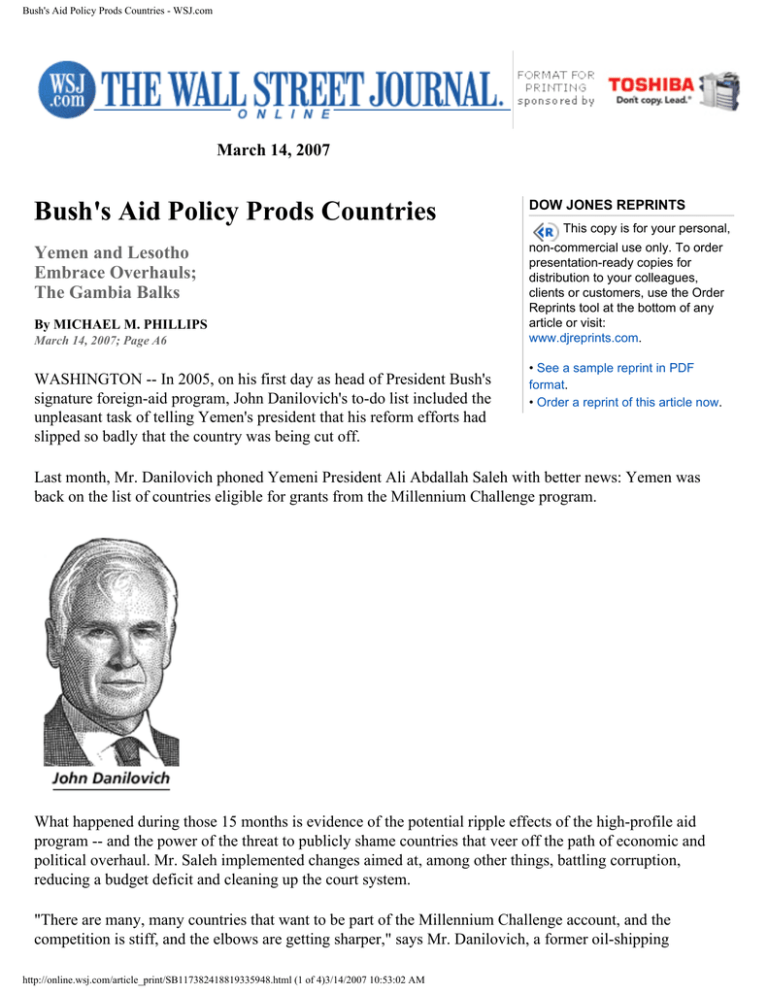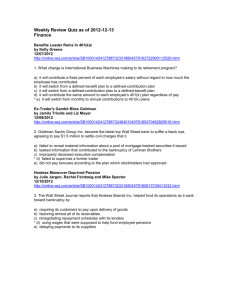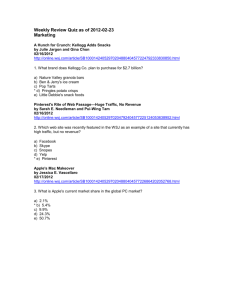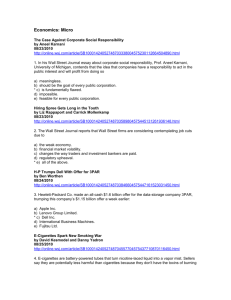
Bush's Aid Policy Prods Countries - WSJ.com
March 14, 2007
Bush's Aid Policy Prods Countries
DOW JONES REPRINTS
Yemen and Lesotho
Embrace Overhauls;
The Gambia Balks
non-commercial use only. To order
presentation-ready copies for
distribution to your colleagues,
clients or customers, use the Order
Reprints tool at the bottom of any
article or visit:
www.djreprints.com.
By MICHAEL M. PHILLIPS
March 14, 2007; Page A6
WASHINGTON -- In 2005, on his first day as head of President Bush's
signature foreign-aid program, John Danilovich's to-do list included the
unpleasant task of telling Yemen's president that his reform efforts had
slipped so badly that the country was being cut off.
This copy is for your personal,
• See a sample reprint in PDF
format.
• Order a reprint of this article now.
Last month, Mr. Danilovich phoned Yemeni President Ali Abdallah Saleh with better news: Yemen was
back on the list of countries eligible for grants from the Millennium Challenge program.
What happened during those 15 months is evidence of the potential ripple effects of the high-profile aid
program -- and the power of the threat to publicly shame countries that veer off the path of economic and
political overhaul. Mr. Saleh implemented changes aimed at, among other things, battling corruption,
reducing a budget deficit and cleaning up the court system.
"There are many, many countries that want to be part of the Millennium Challenge account, and the
competition is stiff, and the elbows are getting sharper," says Mr. Danilovich, a former oil-shipping
http://online.wsj.com/article_print/SB117382418819335948.html (1 of 4)3/14/2007 10:53:02 AM
Bush's Aid Policy Prods Countries - WSJ.com
executive and Republican activist. "If Country X doesn't want to participate, there are many other countries
that do want to participate."
When he announced the initiative in 2002, Mr. Bush promised it would be an effective way to fight poverty
and disease overseas. The grants would be big enough to jolt a country into economic growth but would go
only to nations that met criteria for open markets, social spending and honest, democratic government. So
far, the Millennium Challenge Corp., which runs the program, has approved grants valued at $3 billion to 11
countries. Another 11 countries have gotten "threshold" grants aimed at improving their scores on the 18
eligibility criteria. Altogether, 40 countries -- from Nicaragua to Madagascar -- perform well enough to
compete for aid.
Mr. Danilovich says the program creates an incentive for countries to make sometimes-painful policy
changes, and points to Lesotho as proof. Traditionally, married women in the southern African country had
the same legal rights as children; they couldn't buy land or borrow money without permission from their
husbands. With the Millennium Challenge Corp. pressing for changes, the Lesotho Parliament passed a law
in November putting married women on equal legal footing with their husbands.
"We were very instrumental in getting that bill into Parliament," says Sophia Mohapi, the Millennium
Challenge Corp.'s representative in Lesotho. The country is now negotiating a $360 million aid package.
Only twice has the Millennium Challenge Corp. suspended a country that had already qualified to apply for
aid, and the results were sharply different.
http://online.wsj.com/article_print/SB117382418819335948.html (2 of 4)3/14/2007 10:53:02 AM
Bush's Aid Policy Prods Countries - WSJ.com
In June, the program suspended the Gambia, a sliver of a country in West Africa. The U.S. ambassador in
Banjul, the Gambia's capital, delivered the news to President Yahya Jammeh, who came to power in a
military coup in 1994, then won elections in 2001 and 2006.
In a letter to Congress, the corporation cited "evidence of growing human-rights abuses, increased
restrictions on political rights, civil liberties and press freedoms, as well as deteriorating economic policies
and anticorruption efforts." One incident that contributed to the suspension was the 2005 murder of a
prominent Gambian journalist, gunned down on his way home from work.
The Gambians took umbrage at the suspension and, instead of motivating reform, it has become a point of
friction.
"I'm not claiming we're saints; we do have our hiccups now and then," says Dodou Bammy Jagne, the
country's ambassador in Washington. "But there was nothing new...that could have triggered this situation."
The Gambians suspect that they were being punished for having invited the leaders of Iran and Venezuela -the bêtes noires of U.S. foreign policy -- to an African Union summit that took place in Banjul just days after
the suspension was announced.
Mr. Danilovich says the suspension had nothing to do with foreign-policy tensions and everything to do with
the Gambia's increasingly dictatorial regime. "We're not a reward program for countries that support the
United States," he says. "If the Gambia becomes close with whomever they become close with, that's the
Gambia's business."
The Gambia Journal, a Banjul newspaper, reported that Iranian President Mahmoud Ahmadinejad again
visited Banjul in January. "President Jammeh became well disposed to the anti-American camp after the
Gambia was suspended" from the aid program, the paper said. So far, Gambian officials have shown no
interest in taking steps that the U.S. deems necessary to re-enter the program.
Yemeni officials, by contrast, sought reinstatement from the moment Mr. Danilovich delivered news of the
suspension to President Saleh in November 2005. Yemen's performance had worsened so sharply that it
passed just two of the Millennium Challenge criteria. Mr. Danilovich describes the talk with Mr. Saleh as
"strong and stern."
Another U.S. official described the Yemeni leader as "very upset" by the decision. Nonetheless, at President
Saleh's request, U.S. and Yemeni officials met immediately to discuss how Yemen could get back into the
program.
http://online.wsj.com/article_print/SB117382418819335948.html (3 of 4)3/14/2007 10:53:02 AM
Bush's Aid Policy Prods Countries - WSJ.com
In the following months, the Yemenis embraced sweeping overhauls. The president fired the cabinet
ministers thought to be most corrupt. He removed himself from the highest court. By November, the World
Bank, the Persian Gulf states and other donors were willing to pledge $4.7 billion in assistance to Yemen
through 2010. Last month, the Millennium Challenge Corp. board unanimously voted to reinstate Yemen.
"Countries care really deeply about this seal of approval of good governance," says Sheila Herrling, a senior
policy analyst at the Center for Global Development, a Washington think tank. She gives the Millennium
Challenge Corp. "full credit" for Yemen's about-face.
Write to Michael M. Phillips at michael.phillips@wsj.com1
URL for this article:
http://online.wsj.com/article/SB117382418819335948.html
Hyperlinks in this Article:
(1) mailto:michael.phillips@wsj.com
Copyright 2007 Dow Jones & Company, Inc. All Rights Reserved
This copy is for your personal, non-commercial use only. Distribution and use of this material are governed by
our Subscriber Agreement and by copyright law. For non-personal use or to order multiple copies, please contact Dow
Jones Reprints at 1-800-843-0008 or visit www.djreprints.com.
http://online.wsj.com/article_print/SB117382418819335948.html (4 of 4)3/14/2007 10:53:02 AM





